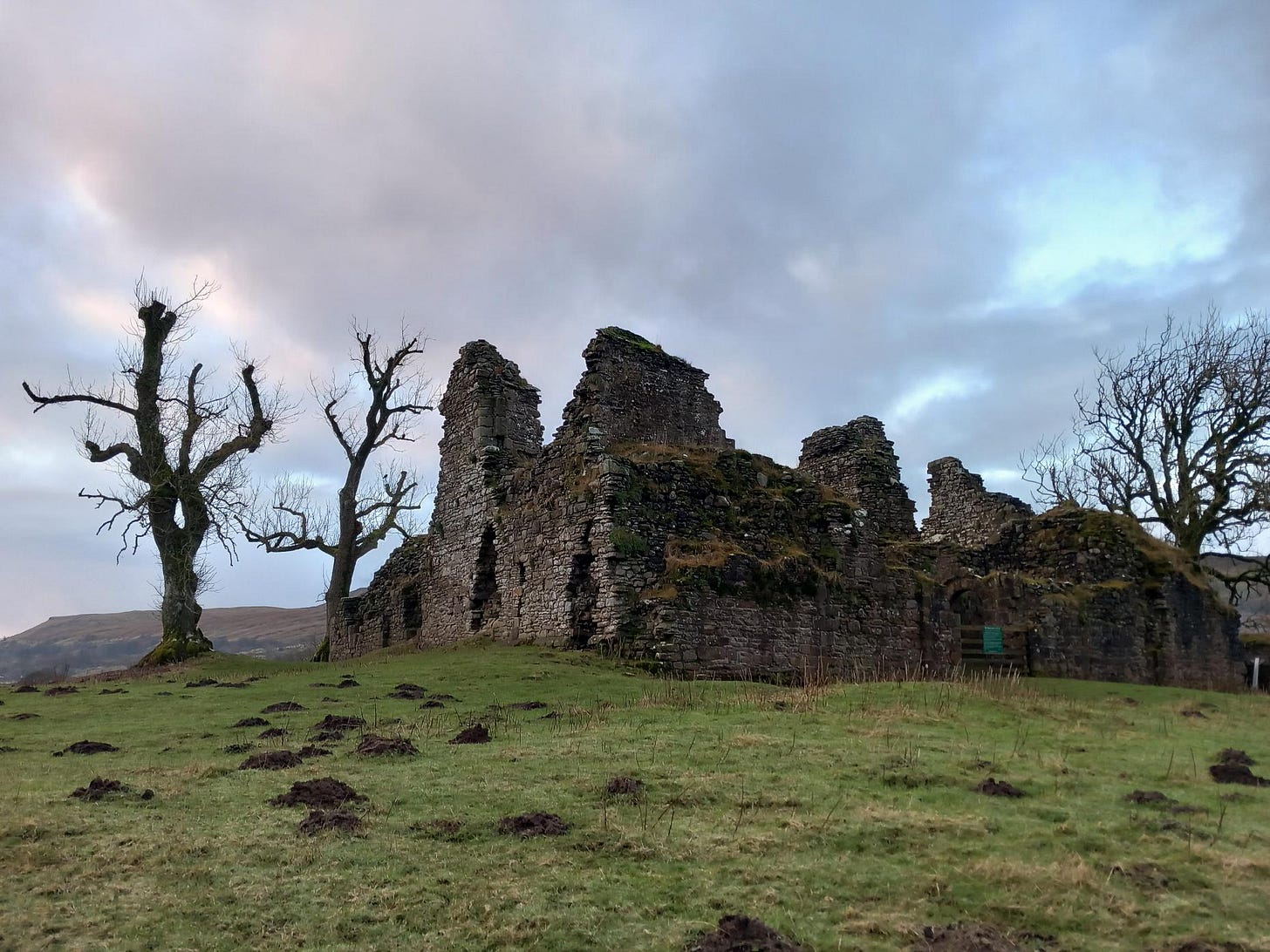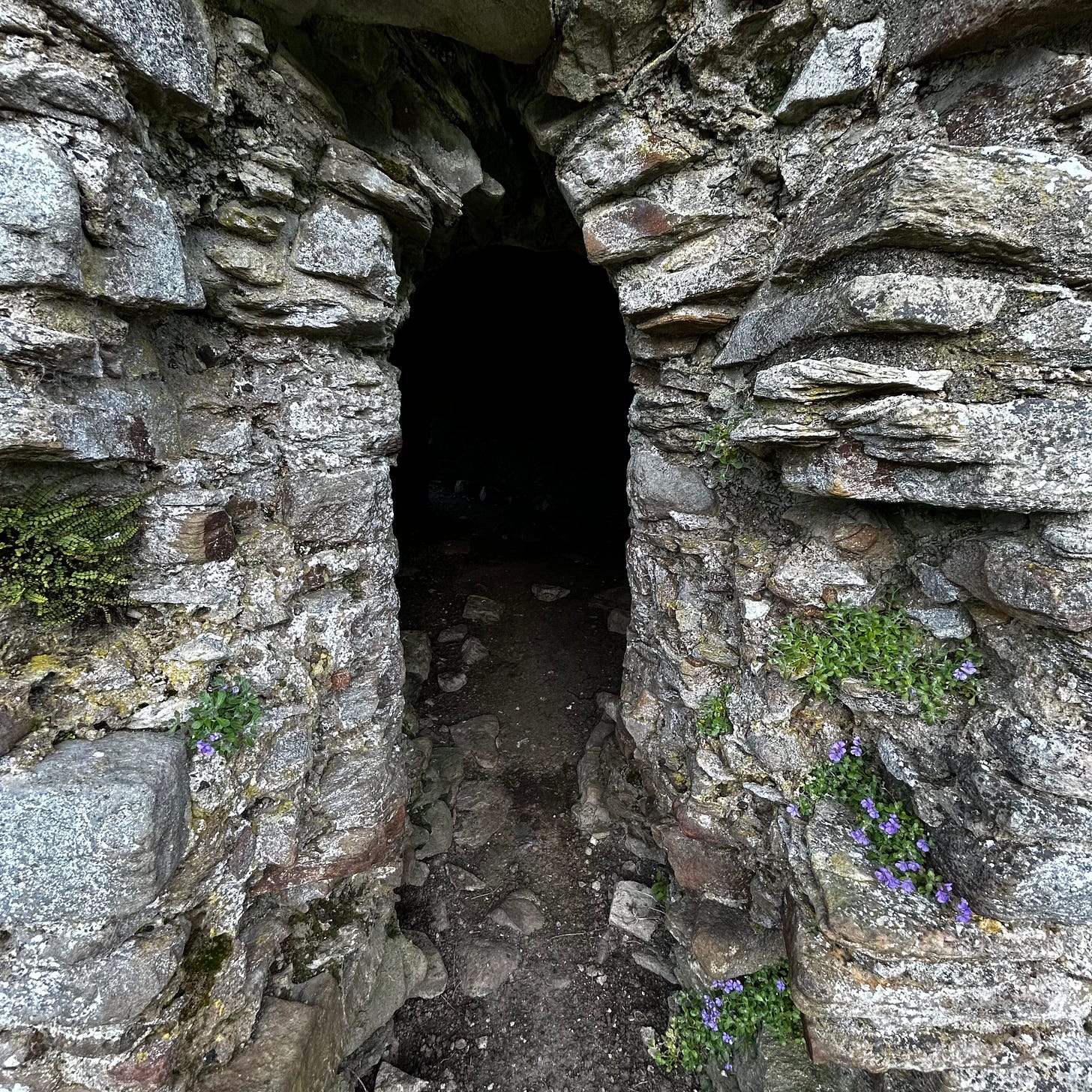They watch us through the waking hours. In our sleep they stand over us. On the walls of Pendragon castle the guards stand down only when their replacements relieve them. For eight centuries the eyes of the battlements have scanned the low approaches and the rising ground, ready to sound the alarm. For hundreds of years, men in heavy tunics, reeking of wet leather and cooled sweat, have held their thoughts of fireside and oatmeal at bay, watching into the last dregs of dusk, listening for footfall through to the peep of day. This valley is the secret back door to the south, the sluice gate through which the north would pour if not for the chisels and the hammers of Norman stonemasons.
They had come a long way from their petty kingdoms in northern France. But they were not for stopping here, the warnings of Borders winters be damned. The castles of Cumbria are only a backstop, stepping stones to a stranglehold. What was it they planned so meticulously to obtain? Everything. Everything that could be seen or touched or carried away.
The tidal race of history runs elsewhere now. The M6 pumps blood north and south past Lune and Shap, ten high moorland miles to the west of us. The A1(M) slithers its way through the fat green lands to the east of the Pennine spine of England, a long day's march and a world away. The two great highways are barely on speaking terms. They exchange curt messages over the A66 from Brough to Barnard Castle. The old drove road south through Mallerstang has been cauterised.
But the valley's stories still breathe. Listen. Up in the old houses which cower in gills and gulleys, electricity as distant as the moon, old men wheeze and whisper. The details are scant. They only know that orders were received. That one evening the last commander of the day guard was touched on the shoulder by two silent, cloaked figures. He never saw their faces. He never looked back, marching south through the night, insisting that his men keep step over the rough ground. The pounding of their feet in unison held the darkness from them.
When the next morning blossomed over Mallerstang Edge, the pair of tawny owls blinked into the creamy sky at the end of their first of many nights on watch. They were relieved by kestrels, strutting the wall tops with their tack and trim, cocking their mannered heads to the high fells, laser ranging every tiny movement in the grass.
As the sun rose, the castle walls stood at ease and with a sigh of sufferance began the long painstaking work of disintegration.
There was brief chatter in the towers and turrets when we moved in next door. The new neighbours. Within range of any decent bowman. An arrow would barely lose speed, slanting down from advantage, across the playful shallows and shadows of the River Eden, herself just a babbling child up here near the source. The jackdaws were sent out to gather intelligence. They gawked and cawed but were unimpressed. Their blue eyes saw through us. We barely merited an entry in the log. At best we'll be here a decade or two. Before they carry us out. Of no tactical import. No strategic significance.
Still, they keep an eye. As do we. Much as we try to look away, look past, look beyond. The bulk of it, rooted in the valley like a broken tooth, patiently draws the tongue-tip of our imagination back to the castle. In quiet moments there is a faint hum as centuries contemplate one another. In a storm, when the trees bend to shed the squall, the castle walls blink away the rain and stare.
These roads to acquisition we follow blindly. This shattered dream of empire we cling to. We have ground time into a bowl of crumbs and live in fear of the gust that will scatter our few moments to the wind. But late at night I can hear, somewhere in the deep belly of the crumbling castle, a smith at his furnace. He is reforging the fragments of continuity, annealing the axle of the ages. Life is reclaiming its own, root by root. The hammer and chisel of the bitter frost are coaxing and cajoling. The spleenwort, making a new home in the old mortar, tells us that we might yet be forgiven. In late spring, purple aubretia cascades down the west wall and urges us to try a different path.







I have been waiting to hear the story of the castle across the river. Thank you for telling it. A demilitarized zone reclaimed by the Earth's vigorous green hand is a hopeful and forgiving kind of place, to my mind. May we spend this time of disintegration imagining something better for our world, and try a different path indeed. x
Another beautiful piece of prose. I love the idea of the birds taking on the watching on the walls after the people have gone. Thank you for posting. You’ve reignited my love of poetry after some decades of no longer reading it. Words have power.